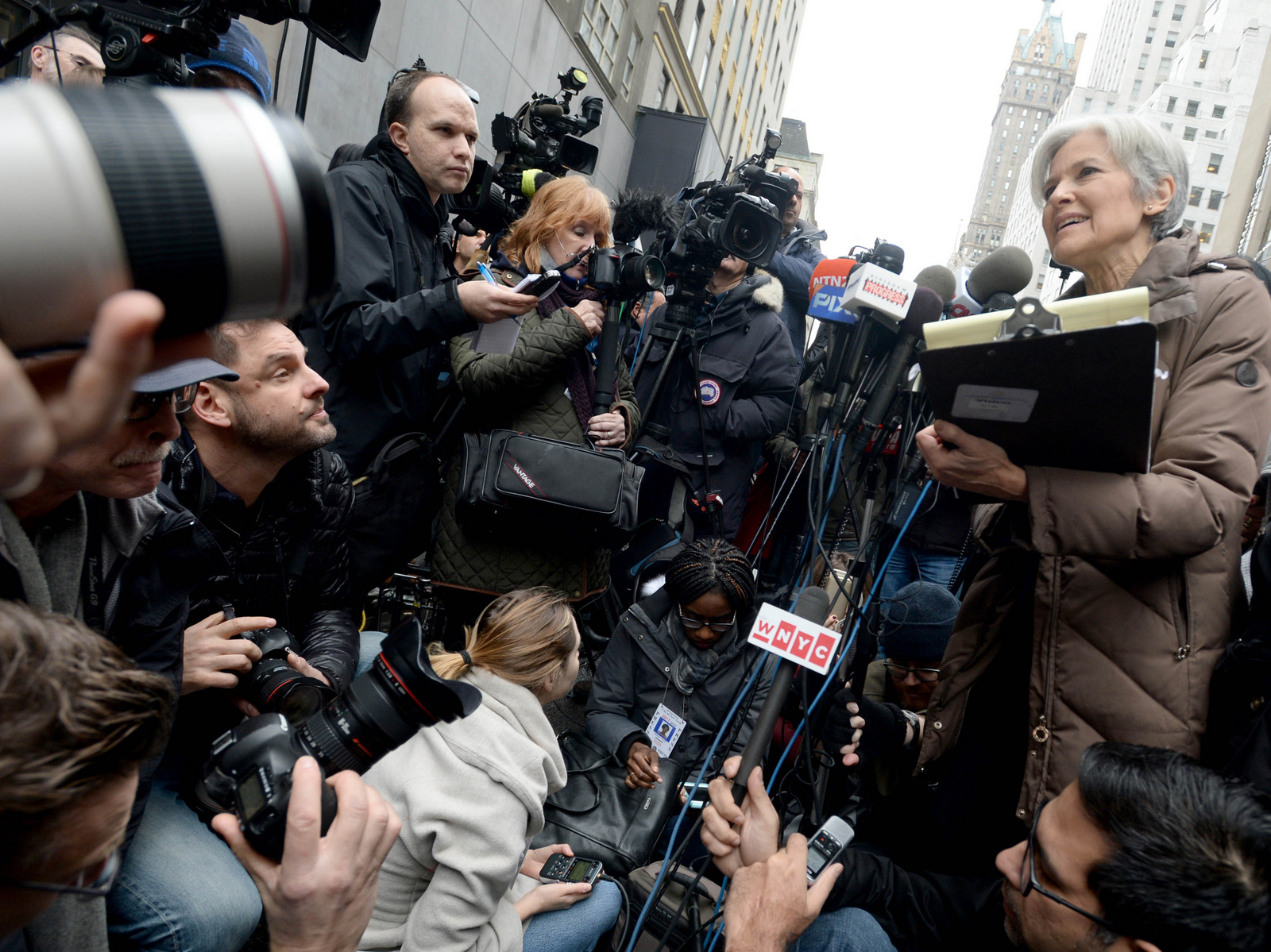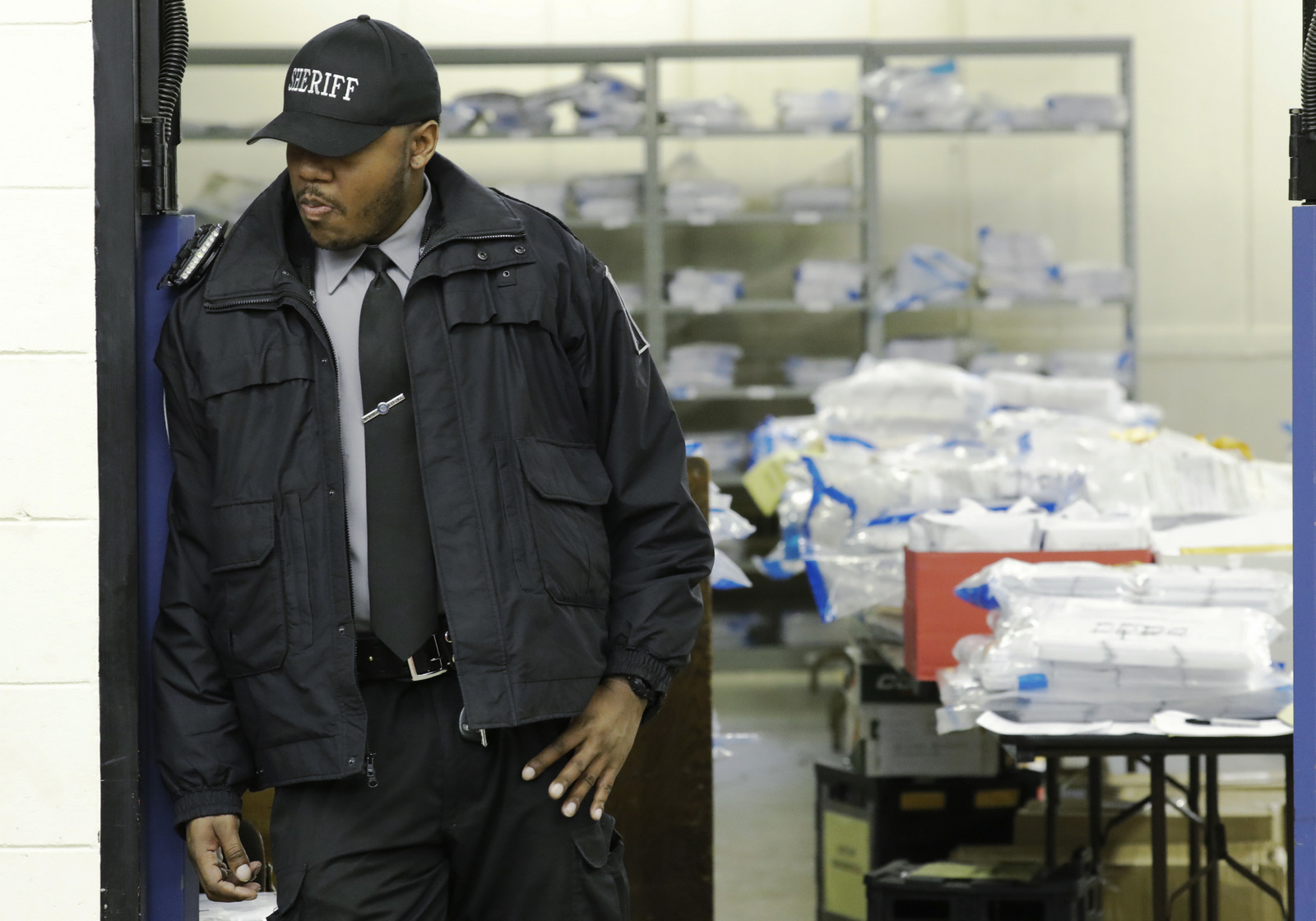
AUSTIN, Texas — Dr. Jill Stein has been attacked in the mainstream media, threatened with legal action, and even created a divide within her own political party due to her attempts to audit the results of the presidential election.
“I think Jill Stein’s doing the right thing,” said Mark Crispin Miller, a self-described “election integrity activist,” in an interview with MintPress News. “I think it’s extremely difficult to argue for any kind of cynical or self-serving motive in this.”
Miller, a professor of media studies at New York University, has spent much of the last decade studying the results of U.S. elections. In the lead up to Election Day, he told MintPress that electronic voting machines in the United States are dangerously vulnerable to hacking and fraud. Now, he says he hopes recounts will encourage more voters to support election reform.
“Beyond their immediate political effects between now and the next election, what the recounts will do is make clear at long last that we must radically reform our abysmal voting system so that this kind of thing never happens again,” Miller said.
Stein and her legal team demanded recounts in Wisconsin, Michigan, and Pennsylvania. To fuel these efforts, she spearheaded a crowdfunding campaign which raised more $6.7 million, a sum barely able to cover the massive filing fees required to force a recount in each state.
Stein and election integrity activists have repeatedly criticized the high costs of recounts and suggested the process should be triggered automatically under certain circumstances. “Whenever races are very close, there should be an automatic recount,” Stein said in a Nov. 30 appearance on Democracy Now!
Independent presidential candidate Roque De La Fuente has also filed for a recount in Nevada, though his efforts have received little media attention.
“I’m only interested in validating the election and exposing the vulnerabilities I believe exist in our current system,” De La Fuente said in a Nov. 30 press release. “I’m not trying to change the results.”
The Wisconsin recount began on Thursday and continued into this week.
On Saturday, Stein’s recount campaign announced its intention to sue Pennsylvania officials in federal court over legal and financial roadblocks to recount efforts in that state.
On Monday, I will escalate #Recount2016 in PA and file to demand a statewide recount on constitutional grounds. The people deserve answers.
— Dr. Jill Stein🌻 (@DrJillStein) December 4, 2016
On Sunday, a judge in Michigan ordered recount efforts to begin by noon on Monday, while the state’s Republican attorney general, Bill Schuette, has said he will sue to block the recount.
Stein and other election analysts have highlighted the problem of “under-voting” in Michigan as a sign of possible election fraud. About 84,000 voters made no selection for president, according to the current official results. Recount efforts have already revealed that many voting machines in Michigan were broken, The Guardian reported on Tuesday.
On Monday, Stein told CNN’s Erin Burnett that the lawsuit in Michigan and attacks on Stein’s recount efforts from President-elect Donald Trump, suggest the GOP fears what a recount could reveal.
“They’re doing everything they can to stop transparency and accountability,” Stein said.
The media’s ‘bizarre refusal’ to take election integrity seriously

While Miller and other activists have applauded Stein’s efforts and over 130,000 of people donated to her recount campaign, she’s also been the target of harsh and sometimes factually inaccurate attacks.
“What’s blown my mind at the moment is the almost universal hostility toward Stein,” Miller said, noting that both mainstream media and relatively progressive journalistic voices have joined in criticizing recount efforts.
Writing for the New Yorker on Nov. 28, Amy Davidson deemed the recount “a corrosive, conspiracy-minded, and slanderous attack on the integrity of our voting system.” On Friday, Chris Conover, a contributor to Forbes’ health blog, The Apothecary, wrote that Stein and others supporting the recount “could have saved the lives of at least 5,000 children had they invested in malaria prevention efforts rather than recounting presidential votes.”
“I shouldn’t be amazed because for over a decade I’ve been struggling to get the press to pay attention to the issue of election fraud, so I’m well aware of their bizarre refusal to go anywhere near the story,” Miller continued.
While election integrity is a vital issue for American democracy, he suggested the issue has been labeled a “conspiracy theory,” which allows it to be dismissed without closer examination.
Other rumors swirling around Stein’s efforts suggest she’s attempting to get rich from the recount, or that the efforts have been funded by powerful Democratic Party insiders such as George Soros. Soros, a wealthy political donor frequently linked to international humanitarian NGOs that actually benefit Western interests, is often falsely accused of paying for protests in the United States.
MintPress made several unsuccessful attempts to contact Stein and her recount team for comment on these issues. However, she addressed several of these concerns in her Democracy Now! interview, in which Stein told host Amy Goodman that she isn’t legally able to use the recount money for personal gain or even to support the Green Party.
“FEC rules require that a recount be funded by a dedicated recount account, and the money can only be used for that,” she said.
Stein also noted that because the recount is part of her presidential campaign, campaign finance laws limit the size of the donations she can accept for the recount. Stein continued:
“The average donation is $45. One-half of 1 percent of donors contributed more than $1,000. And the absolute maximum is the maximum you can contribute to a political campaign, which is $2,700.”
‘We don’t agree with it, but she has the right to do it’

A statement published Nov. 28 on the website of Dr. Margaret Flowers, a Green Party member whose bid for the Senate failed this year and 2016 co-chair of the Green Party convention, begins:
“We write to reaffirm our commitment to building a Green Party that has a radical analysis of the society in which we live, and promotes bold solutions to transform our society and address the root causes of those crises; a Green Party that is independent of the two money-dominated parties.”
The statement, which is cosigned by numerous notable Green Party supporters including activist and author Chris Hedges and Rosa Clemente, the 2008 Green Party vice presidential candidate, accuses Stein of aligning the Green Party with the Democratic Party through the recount effort. The statement also suggests that Stein did not follow proper Green Party procedures for receiving approval for the recount, although it is within her legal rights as a candidate to call for recounts.
“We don’t agree with it, but she has the right to do it,” Flowers said in an interview with MintPress. “People are saying this really stinks, this wasn’t done in the proper way.”
Rather than targeting states where Democratic candidate Hillary Clinton narrowly lost to Trump, Flowers said the Green Party should be investigating potential irregularities which affected Green votes, such as a social media rumor that Green votes were stolen in Maine.
She also objected to recount filings which suggest Russian hackers could have interfered with the election, which she called “dangerous propaganda” with little evidence to support it. It’s also a charge that was leveled against Stein after she attended a December 2015 conference sponsored by Russian-owned TV network RT.
“Now she’s turned around and is using the Democrats’ argument,” Flowers said.
Flowers also said she perceives the recount as a distraction from the larger agenda of the Green Party, which is currently focused on building power in local and state communities.
“I think as we begin to see results that actually translate into a more secure voting system, that minds will change,” Stein said in her appearance on Democracy Now! Stein in response to some of the criticisms she’s received from her party.
Stein continued:
“The Greens, you know, are very focused on economic justice, racial justice, climate justice, you name it. And as a—for many Greens, especially newer Greens, electoral integrity has not been a priority.”
While agreeing that the Green Party should focus on economic, racial and climate justice, Flowers rejected the notion that the membership ignores the importance of electoral integrity. She said many party members object to the recount because one of the two major parties is most likely to benefit.
“Many Greens work on election integrity,” she said. “The concern was that the way that it was done — we’re basically picking up the Democratic Party’s water and carrying it.”
Despite these differences, Flowers expressed her respect for Stein’s work as a candidate and activist. “She and I disagree on this. It doesn’t change my respect for all the work that she did over years to very tirelessly build up the Green Party.”
Ultimately, Flowers said she hopes the conflict will lead to better procedures for finding consensus and making decisions within the Green Party:
“Personally, I don’t shy away from these types of conflicts. I think they can be really important moments for growing and learning. I feel pretty strongly that the party is going to come out stronger because of all this.”
‘The perilous condition of our electoral democracy’

Mark Crispin Miller said it’s all but impossible that the recounts will actually change the result of the election. And even if the recount uncovers clear evidence of fraud, he suggested the Democrats’ reluctance to contest the 2000 and 2004 election results will repeat in 2016.
“The Democrats have never contested election results,” he said, “and I don’t believe Clinton is any more inclined to do that than Gore or Kerry was.”
Despite the ineffectiveness of the Democratic Party, Miller believes the recounts could reveal strong evidence of election tampering:
“What I hope happens is that the recounts are successful enough to verify that there was extensive fraud in this election so that it then becomes impossible to keep the subject under wraps and for the press to continue to act as if it can’t happen here.”
The United States trails behind other countries when it comes to the reliability of elections, according to the Electoral Integrity Project, a study carried out by researchers at Harvard University and the University of Sydney.
In addition to the irregularities uncovered in Michigan, Miller cited discrepancies between final election results and pre-election polls and exit polls which suggested Clinton would win key swing states as a sign of potential electronic voting fraud.
“Confronted with an election result that diverges wildly from tons of pre-election data and tons of election day data, people will automatically assume that the data is wrong and the official outcome is right,” Miller noted.
Yet he also observed that such irregularities frequently lead U.S. officials to accuse foreign countries of election fraud. As a hypothetical example, Miller suggested: “What if in Russia all the polls before the election and all the exit polls told us that one of Putin’s adversaries was going to win, but then Putin won by a large margin?”
Miller continued:
“We trust these private voting machine companies, most of which were founded by right-wing Republicans. They simply tell us what the tally is and we believe them and the media believes them. And if anyone like Jill Stein suggests we verify the results, they treat her as the skunk in the garden party.”
Above all, Miller concluded, the priority right now should be safeguarding democracy, no matter what the recount efforts reveal.
“There are a lot of people who are sincerely convinced that stopping Trump is the most important thing right now and I respect that view and I share it to some extent,” he said, “but I think that the perilous condition of our electoral democracy is the most important issue, ultimately.”


